Welcome!
This is your virtual country space to connect, engage, learn and explore everything that is important to help you grow your business beyond borders. Your views are important! Share a post, participate in discussions, and speak-up in our polls - tell us about the tools, resources and connections that will help you.
Welcome to the Botswana Country Space on JamiiTrade, where you can connect with fellow entrepreneurs or companies from across Africa who are interested in doing business with Batswanan entrepreneurs.
You are also able to explore practical how-to information and useful tips (Insights) for entrepreneurs, start-ups and SMEs on doing business in the country. Whether it is how to register a company or getting your products ready for export, we aim to provide you with all the information at your fingertips (or help find the answers for you if we don't).
Become an active community member by connecting with fellow country Jamii-ers, sharing your own experiences to help others learn, participating in discussions or starting a new one. Your views are important in helping us make this country space relevant to you.
I am looking for business partners from Botswana. I am interested in hydroponic and aeroponic farming in Lesotho.
SHARE PRICE PERFORMANCE OF LISTED COMPANIES:
A glance at how the shares have performed at half-year mark. Share prices of 18 companies have gone up, of 5 companies have declined while 9 experienced no change.
What do these share price movements mean to you? If you invested P10,000 in Standard Chartered, the value of the investment has grown to P12,300 over the past 6 months as the share price gained 23%. If you invested P10,000 in Access Bank, the value of the investment has dropped to P9,950 as the share price declined by 0.50%.
You can use closing share prices to calculate the value of your investment, its growth or decline depending on which stocks you hold, and the returns you can realise when you sell the shares.
Share your experience, which stocks are you invested in and how are your stocks performing?
Botswana may fall short of 4.2% growth target
Botswana's economy may fall short of the government's 4.2% growth target for this year, a senior central bank official said on Tuesday, citing global and domestic constraints.
Finance minister Peggy Serame made the projection for a 4.2% increase in GDP in a budget speech in February, saying the government expected growth to accelerate from 2023 due to an improved performance in the diamond sector. Gross domestic product grew 2.7% in 2023.
However, Botswana's mining sector, which is dominated by diamonds, is still struggling, reflecting sluggish market conditions globally.
Sales at Debswana Diamond Company, a joint venture between the southern African country's government and Anglo American's De Beers unit, were down about 48% year-on-year in the first quarter of 2024.
"From what we have seen in the first half of the year, unfavourable global economic condiions ... as well as domestic structural constraints, one would expect that we are unlikely to attain the projected economic growth," Innocent Molalapata, the central bank's director of research and financial stability, told an economic briefing.
"A downward revision of the growth target might therefore be required," Molalapata said, adding that mining output contracted roughly 27% in the first quarter.
The Bank of Botswana tends not to give precise GDP growth forecasts, leaving that to the finance ministry.
The International Monetary Fund forecasts Botswana's economy will grow 3.6% in 2024.
Botswana: The Pragmatic Path to Prosperity
Once one of the poorest countries in the world, Botswana has experienced growth and development post-independence at a pace second to none. Today, Botswana stands as the least corrupt nation in mainland Africa, boasts the highest economic freedom score in the region, and maintains a GDP per capita on par with other emerging economies, such as Brazil and Turkey. Botswana’s economic, social, and political development represents one of modern Africa’s greatest success stories: a story that provides valuable insights on how strong leadership, with a keen emphasis on pragmatism over ideology, can guide nations out of poverty.
The Protectorate
Botswana’s pragmatism can be traced as far back as the colonial era, which involved uncharacteristically significant cooperation with colonialists. In the mid-19th century, when Tswana chiefdoms found themselves stuck in the “crossfire” between British, German and Boer militants, they made pleas to the British Crown for protection. Following their defeat in the Anglo-Boer War, the British finally agreed and established the Bechuanaland Protectorate in 1885. The Protectorate benefitted both the British and the local Tswana (in the short run), providing the former a strategic link between Central and Southern Africa, and the latter protection from Boer threats under the General Act of The Berlin Conference.
Since British interests in Bechuanaland were primarily strategic, not economic, the extent of colonialism was less severe than that of neighboring colonies. The British exercised indirect rule, with administration still consisting of indigenous institutions and leadership of traditional chiefs. The comparatively less grievous (but nonetheless characteristically exploitative) colonial experience may be one reason that Botswana was one of the few African colonies to achieve independence without the emergence of a significant nationalist movement.
One key instance, however, where Britain overstepped “indirect rule” was the expulsion of Sir Seretse Khama, the heir to the chiefdom of Bangwato from Bechuanaland. Khama’s marriage to Ruth Williams was frowned upon by the Cape Colony, where apartheid was enforced and interracial marriage was illegal. The Cape Colony exerted enough pressure on Britain that the House of Commons overturned tribal courts, or kgotlas, and forced Khama into exile in 1951. Nevertheless, he would later be knighted in Britain by Queen Elizabeth II for his political contributions and role in Botswana’s formation.
Khama was only allowed to return to his homeland upon renouncing his chieftainship. Thus, he returned to Bechuanaland in 1956 as a private citizen, founding the Democratic Party of Botswana and gaining domestic legitimacy through democratic support as opposed to ancestral tribal lineage. Khama’s demotion from heir to private citizen would significantly empower Botswana's political development as a stable democracy. By becoming Bechuanaland's prime minister and later the independent Botswana’s first president, he inadvertently transformed the political legacy of the nation from tribal to democratic. Since Khama’s claim to power was now through democracy as opposed to ancestry, his rise would help establish and legitimize republican democracy in Botswana. As a fortunate consequence of his progressive marriage, Botswana became a leader of democracy in Africa, second only to Mauritius in the EIU Democracy Index.
Early Independence
On September 30, 1966, Bechuanaland gained independence, establishing the Republic of Botswana. When Khama was elected to office, the nation had almost no prospects for growth and development. Botswana had a total of 12 kilometers of paved road and only 22 citizens who had attended university. Almost all of its citizens were illiterate (there were, in total, 100 high school graduates) and the nation ranked amongst the poorest in the world by GDP per capita. The newly independent government was reliant on British aid for nearly half of its budget.
Much of colonial Africa turned to nationalism in this period of early statecraft. Some states were able to make considerable progress, though often at the expense of human rights, democracy, or the rule of law. Khama’s approach, on the other hand, avoided radical ideology. He believed that Botswana’s citizens should enjoy increases in standard of living without losing basic civil and political liberties.
Botswana’s economy was dominated by livestock production. Livestock products accounted for more than 90 percent of exports and cattle outnumbered humans about three-to-one. As the nation's primary economic activity, livestock production was not particularly profitable or effective. Drought conditions and insufficient water supply posed real challenges to the sector; at multiple points in the 1960s, Botswana was reliant on famine relief aid to feed its citizens. To begin expanding the economy beyond its reliance on livestock and towards Botswana’s diverse mineral resources, Khama borrowed heavily from abroad. This brought the tools to Botswana for small scale mining operations, producing some gold, kyanite, copper, and more sizable amounts of asbestos and manganese. While Botswana's early leaders adopted some neoliberal policies, they recognized the dangers of depending on the IMF and World Bank too heavily and thus ensured to keep them at arm’s length.
As Botswana's development began, it once again found itself in an unusually practical arrangement to solve a post colonial issue: the lack of skilled administrators to run the government. Since there were barely a few hundred formally educated local citizens, Khama had former British administrators from the colonial period to continue serving in government until enough qualified locals rose to the responsibility. This sense of pragmatism further extended to Khama’s foreign affairs, as he chose to adopt a policy of non-alignment, distinguishing Botswana from its surrounding regimes without antagonizing them.
Diamonds
Since other countries in the region had vast deposits of diamond reserves, Sir Seretse Khama had good reason to begin the search for diamonds in Botswana. However, many other oil, mineral and diamond rich nations had begun to politically collapse and backslide towards corruption and authoritarianism. This resource curse was exemplified by Nigeria and the Central African Republic, which suffered despite (if not due to) oil and diamond reserves respectively, serving as a cautionary tale for Botswana. Khama organized a unique approach to diamonds in Botswana by striking a deal with the Tswana clan leaders. Since diamonds could potentially be discovered in some regions but not others, the clan leaders agreed beforehand to a resource-sharing agreement that disregarded domestic territorial claims. This would prevent any ‘geographically lucky’ clans from hoarding the nation’s wealth and ensure that all regions of Botswana reaped the benefits of future diamond mining. Khama struck this deal despite having been slipped the knowledge that his clan’s territory was diamond rich; he put his clan’s interest aside in the name of his nation.
In 1967, a team of De Beers geologists led by Manfred Marx collected soil samples with promising indicators for diamonds near the Kalahari Desert. This led to the development of the Orapa mine for 21 million rand in 1971–the largest open pit diamond mine in the world. To maximize this opportunity, Botswana established Debswana, a joint venture with De Beers. Debswana is the equal partnership between the Government of Botswana and De Beers, which each own half the company. Moreover, ownership of Botswana's Diamond Trading Company was split equally between the government and De Beers. This partnership has been conducive to business, giving both the private and public sector shared responsibility over operations. Under this agreement, De Beers estimates that for every dollar they earn in Botswana, 80 cents goes to the government.
The Orapa mine catapulted Botswana’s economy forward: for the thirty years between 1965 and 1995, Botswana had the fastest rate of economic growth in the world. Debswana’s success enriched the government, which in turn could maintain a stable, low tax rate, further leading to investment from multinational corporations, thus accelerating economic growth. The profits from diamond production were reinvested by the government in healthcare, education, and infrastructure, which significantly boosted human development. Public hospitals and universities raised social standards in the nation, and infrastructure projects boosted economic accessibility, transforming Botswana into a middle income country. Today, diamond production is responsible for one-third of Botswana's GDP, half of its public spending, and 80 percent of its export revenue.
The Diversification Question
During this period of extreme growth, Botswana co-established the Southern African Development Community to reduce the region's reliance on the economic strength of South Africa and Rhodesia, two militarily aggressive states with little regard for human rights. Botswana abandoned the South African rand and established their own currency, the pula. The Central Bank regulated the pula effectively, meeting the needs of local businesses and making it one of the strongest and best performing currencies on the continent. Botswana displayed the necessary pragmatism to adopt successful policies from other countries, such as “Singapore-inspired work improvement teams” to increase economic productivity. Despite this growth and success, however, Botswana struggled to achieve both political and economic diversity.
Botswana's early successes have not translated to an equal distribution of power and diversity in the political landscape. Following Sir Seretse Khama's death in 1980, he was succeeded by his Vice President, Sir Quett Ketumile Joni Masire. Masire was widely successful, winning reelection for 18 straight years. Despite being a multi-party democracy on paper, since independence, the only party to hold administration in Botswana is the Botswana Democratic Party. The party has been led by two generations of Khama, first between 1966 to 1980 by Sir Seretse Khama and later between 2008 to 2018 by his son, Ian Khama. No other party has won the general election, a fact that may inadvertently undermine democracy in Botswana in the future. In 2018, Mokgweetsi Masisi from the BDP was elected on a populist platform, marking over 50 years of power for the BDP. It seems unclear whether the BDP's dominance leaves any room for a healthy political landscape; to what extent can democracy in modern Botswana be considered multi-party? Another significant challenge lies in the power De Beers holds over Botswana’s sovereignty. De Beers’ influence over politics could be a major threat to democracy in Botswana. With questions of political diversity and neo-colonialism, new obstacles loom over Botswana’s political class.
Economic diversity is an even greater challenge for Botswana. Despite attempts to move towards a knowledge-based tertiary sector economy, Botswana’s economy remains dominated by diamonds and livestock production. The underdevelopment of other sectors has led to both high wealth inequality and rising unemployment. In June, Botswana struck a revised deal with De Beers to gain more ownership of diamonds mined in Botswana and to introduce downstream operations, such as diamond cutting and polishing, to the economy. Experts argue this new deal marks the beginning of the end of De Beers’ monopoly over diamond production in Botswana. Moreover, if production continues at its high pace, Botswana may begin to run out of its diamond reserves in the coming decade. If Botswana does manage to overcome stagnation, inequality, and unemployment long term, it would only be by significantly restructuring and diversifying its economy.
With new challenges on the horizon, it is unclear whether Botswana's economic and political legacy will stand tall or begin to collapse. The nation owes much of its prosperity today to the shrewd and pragmatic governance of its early leaders. Will the strong leadership that brought the nation this far live on? Or will Botswana’s economic and political challenges prove too great–and crack Africa’s brightest gem?
Ninety-One eyes private debt for pension inflows
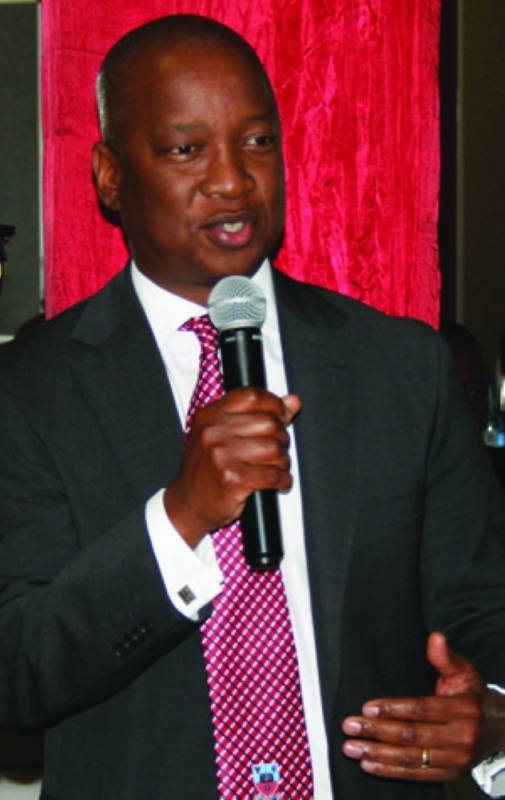
Seeing opportunities: Sebonina, is seeing opportunities for the returning pension fund billions in private debt as well as infrastructure credit, transactions that would grow the local economy.
Ninety-One Botswana managing director, Martinus Seboni, told BusinessWeek that more businesses were moving away from the traditional funding sources for the expansion. The asset manager is part of a global group with assets under management of about $160 billion.
“We think the next growth area is private debt and in particular credit that is not listed,” he said on the sidelines of a recent stakeholder update by the asset manager. “So what we are seeing is that a lot of mid-sized companies are looking to expand and grow their businesses. “Traditionally, they go to the banks to borrow that money because they have had that relationship and are more comfortable going there. “We are saying they are beginning to open up their balance sheets to allow other capital to come in. “And so for that, we think there’s an opportunity.”
Botswana to invest economic gains in infrastructure focused stimulus
Botswana sees a recovery in economic growth this year and plans to increase spending on infrastructure development in a "stimulus" budget, its finance minister said on Monday.
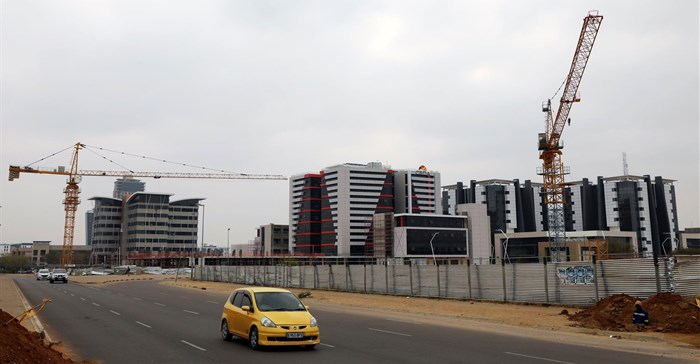 A car drives past a construction site of the Central Business District (CBD) in the capital Gaborone.
A car drives past a construction site of the Central Business District (CBD) in the capital Gaborone.
South Africa's neighbour country's economy was hit by a decline in demand for diamonds last year. The gems generate about 30% of its revenue and 70% of its foreign exchange earnings.
Finance Minister Peggy Serame said in a budget speech that growth was estimated at 3.2% in 2023, lower than a previous forecast of 3.8%, picking up to 4.2% this year and 5.4% in 2025 premised on the world economy recovering.
Felix Onuah 21 Jul 2023
Serame said the 2024/25 fiscal year's budget deficit was estimated at 8.69bn pula, higher than the current fiscal year's estimated 7.13bn pula deficit.
"The proposed budget will address a wide range of infrastructure gaps," she said, citing projects planned in the water, transport and energy sectors. Overall, spending on infrastructure development would rise more than 33% in 2024/25.
The government will seek to mobilise additional resources by issuing instruments such as inflation-linked bonds and green bonds, she added.
Botswana: African Development Bank Group commits $180 million to bolster post-Covid-19 economic recovery

The African Development Bank is providing $180 m to support Botswana's economic recovery.
The Board of Directors of the African Development Bank has approved a loan of $179.66 million to support government reforms to restore post-pandemic fiscal stability and economic recovery.
The funds for phase II of the program will build on the successes of the first phase by supporting policy measures designed to boost economic recovery, further ease private sector participation in the economy and promote climate-smart agriculture and industrial development. These include various revenue enhancing measures, establishment of a public procurement regulatory authority and facilitation of public private partnerships.
The program will also propel private sector-led agriculture and industrial transformation. It will achieve this through the approval of a national policy on agricultural development and transformation, creation of a meat industry regulator and improvement of the investment facilitation regime.
To enhance resilience and social inclusion, the program will strengthen the policy framework for micro, small and medium enterprises (MSMEs), promote the adoption of a technical and vocational training policy and roll out of a single social registry.
Botswana’s economy remains largely undiversified in terms of exports. In the last decades, the country has followed a natural resource-based model that depends significantly on diamond mining. The country has a large public sector. Still, Botswana enjoys satisfactory macroeconomic stability despite the Covid-19 pandemic and the impact of Russia’s invasion of Ukraine.
The program will directly benefit several government ministries, departments and agencies. Prominent among these are the Ministry of Finance, Ministry of Minerals and Energy, Ministry of Agriculture and Ministry of Trade and Industry, as well as the revenue service and the agencies tasked with overseeing private sector development. Businesses, including MSMEs, will benefit, particularly those in agriculture and manufacturing. The program is also expected to have a positive impact at the national level, particularly for women and youth.
The program aligns with the Bank Group’s Ten-Year Strategy (2013-2022) and its High Five strategic priorities, particularly Industrialize Africa and Improve the quality of life of the people of Africa.
In Southern Africa, Leveling the Playing Field at Birth Critical to Reducing Inequality, Intergenerational Poverty
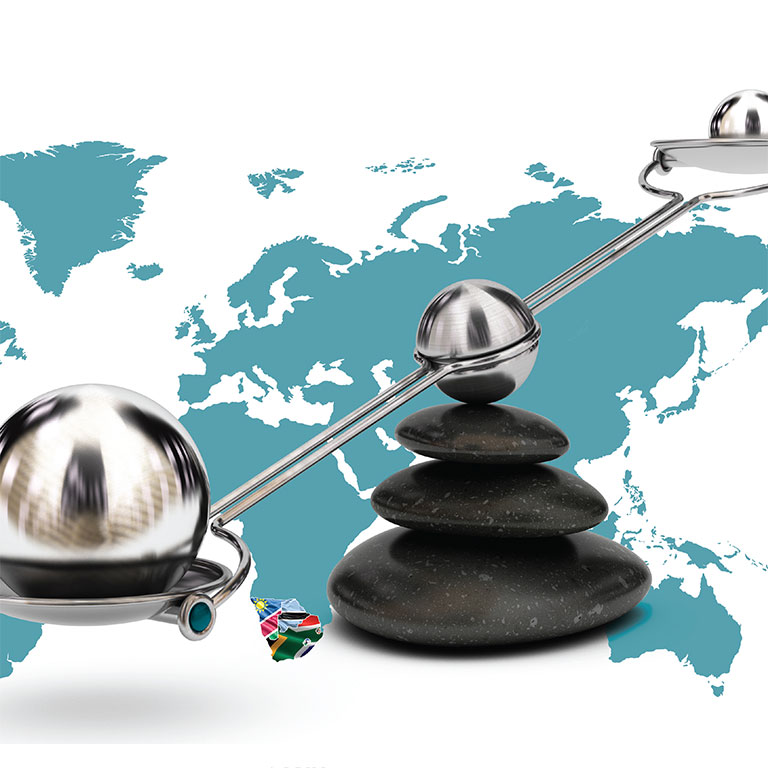
STORY HIGHLIGHTS
- A new report finds that inherited circumstances over which an individual has little or no control drive overall inequality in the Southern African Customs Union (SACU) region
- Lack of access to jobs and key productive assets, such as skills and land combine with conditions at birth to further perpetuates inequality
- The assessment suggests three policy options for accelerating inequality reduction, including strengthening resilience to climate change risks and economic vulnerability
PRETORIA, March 14, 2022—Overall inequality in the Southern African Customs Union (SACU) is driven largely by inequality of opportunity. The report, Inequality in Southern Africa: An Assessment of the Southern African Customs Union, says climate and economic shocks such as the COVID-19 pandemic, which generally affects poor people more severely, makes gains towards a more equitable society fragile.
Comprised of Botswana, Eswatini, Lesotho, Namibia and South Africa, SACU is the world’s most unequal region. Average inequality in SACU countries has declined since the 1990s but remains relatively high compared to both other Sub-Saharan African and upper-middle-income countries. In 2010–15, the average Gini coefficient for SACU countries was around 59, compared to 42 for Sub-Saharan African and upper-middle-income, the report shows. There is, however, heterogeneity across countries; with a consumption per capita Gini coefficient of 67 in 2018, South Africa ranks as the most unequal country in the world, according to the latest World Bank data. The Gini coefficients of all other SACU countries except Lesotho, exceeded 50. Even Lesotho, with a Gini coefficient of 45 in 2017, was among the top 20% of unequal countries.
The report finds that the contribution of inequality of opportunity to overall inequality in SACU has increased in recent years. This is perpetuated by poorly functioning labor markets that are characterized by high unemployment especially among the youth, and where inherited circumstances continue to determine employment outcomes and earnings. Further, there are barriers to accessing productive assets such as education, skills, and land that people need to generate income and improve their wellbeing.
“Leveling the playing field at birth through expanding coverage of quality education, health, and basic services to disadvantaged populations in the SACU region is critical to reducing inequality and breaking the intergenerational cycle of poverty,” said Marie Francoise Marie-Nelly, World Bank Country Director for Botswana, Eswatini, Lesotho, Namibia, and South Africa.
The report provides a comprehensive diagnosis of the sources of inequality in SACU, finding that differences in circumstances children are born into, over which they have little or no control, explains at least one-fifth of inequality in SACU. Further, when race is included in the analysis, the contribution of inequality of opportunity in South Africa more than doubles. Circumstances at birth and during childhood, such as gender, race, location, parental education, and family wealth, are strongly associated with inequality of opportunity, even before people interact with factor markets.
The report also shows that lack of jobs and access to key productive assets such as education, skills, and land, is slowing down progress towards a more equitable income distribution. In addition, inequality in wealth is high and invariably results in inequality of opportunity. As a result, intergenerational mobility remains among the lowest in the world. In a context where jobs are scarce and skilled labor is in short supply, having post-secondary or tertiary education is key to both accessing jobs, and obtaining better wages once employed.
“To accelerate inequality reduction, SACU countries can build on what they are already doing well with the same resources through improving the efficiency and effectiveness of social spending,” said Pierella Paci, World Bank Practice Manager of the Poverty and Equity Global Practice for Eastern and Southern Africa.
The report also finds that fiscal policy in SACU significantly reduces poverty and inequality through progressive tax and benefits systems and by spending a relatively big share of their public resources to social sectors such as education, health, and social protection. However, despite considerable social spending, outcomes are relatively poor and highly unequal. The contribution of social spending to inequality reduction could be enhanced by improving quality, targeting, and efficiency.
The report suggests three policy measures to accelerate the reduction of inequality in SACU region, including:
- Promoting policies that foster equality of opportunity through expanding coverage and quality of education, health and basic services across sub-regions and disadvantaged populations.
- Addressing the highly skewed distribution of productive assets by strengthening access and availability of private sector jobs, facilitating entrepreneurship and skills acquisition for disadvantaged populations and improved access to land and productivity in rural areas.
- Investing in adaptive social protection systems to increase resilience to climate risks and economic vulnerability while enhancing targeting of safety net programs towards the most vulnerable populations for more efficient use of fiscal resources.
President Mokgweetsi Masisi of Botswana visits the Legatum Center at MIT
His delegation’s trip to campus included a conference on entrepreneurship and a meeting with Institute President Sally Kornbluth.
President Mokgweetsi Masisi of Botswana delivering a keynote speech at a conference, “Innovation in Global Growth Markets: Prosperity Through Entrepreneurship,” hosted by the Legatum Center for Development and Entrepreneurship at MIT on April 30.
Credits
:
Photo: Adam Glanzman
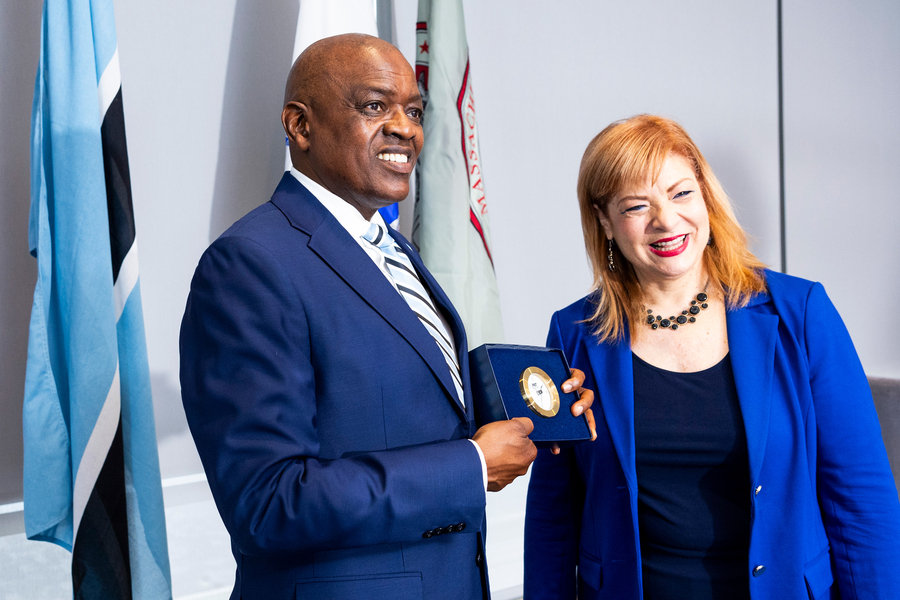
Caption
:
President Mokgweetsi Masisi of Botswana meets with Georgia Perakis, the John C Head III Dean (Interim) of the MIT Sloan School of Management at the conference.
Credits
:
Photo: Adam Glanzman
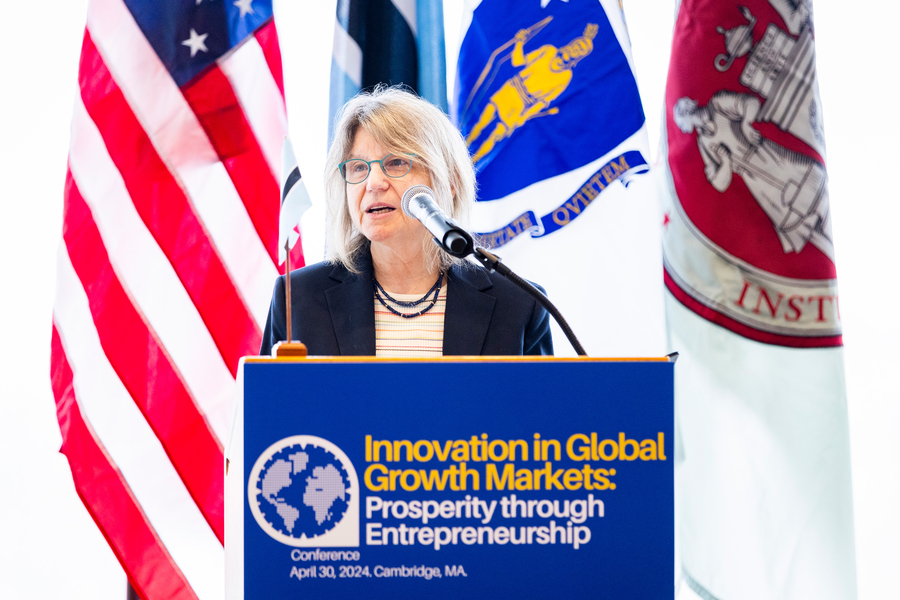
Caption
:
President Sally A. Kornbluth of MIT delivered a speech at the conference, and highlighted the ways that the Legatum Center — which is part of the MIT Sloan School of Management — enables innovation-driven economic growth.
Credits
:
Photo: Adam Glanzman
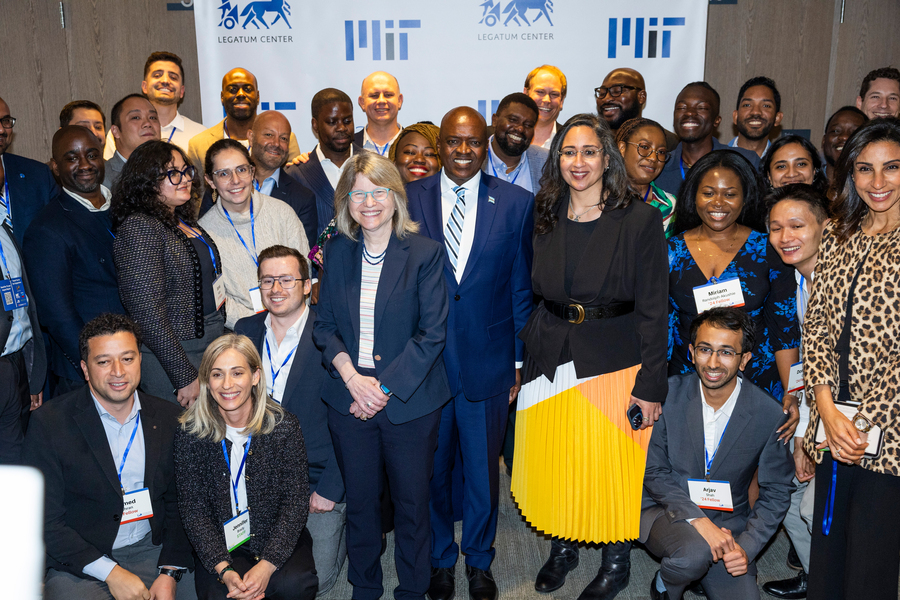
Caption
:
Participants at the conference pose for a group photo. The three figures standing in the center are, from left to right, MIT President Sally A. Kornbluth; President Mokgweetsi Masisi of Botswana; and Dina H. Sherif, executive director of the Legatum Center.
Credits
:
Photo: Adam Glanzman
Previous image
Next image
President Mokgweetsi Masisi of Botswana visited the Legatum Center for Development and Entrepreneurship at MIT on Tuesday, delivering a speech on the value of entrepreneurship in growing economies and affirming an interest in working with the center on spurring innovation in his own country.
“Innovation is … not a privilege for the few, but a powerful tool that should be accessible for all,” Masisi said during a speech at the Legatum Center’s “Innovation in Global Growth Markets: Prosperity Through Entrepreneurship” conference, marking the center’s 15th anniversary.
Botswana, Masisi said, should undertake a “deliberate effort to deliver a vibrant innovation ecosystem by increasing investment in science, technology, and innovation, thus creating space for our current and future generations … to thrive and ensure an improved quality of life” in the country.
MIT President Sally A. Kornbluth also spoke at the event, highlighting the ways that the Legatum Center — which is part of the MIT Sloan School of Management — enables innovation-driven economic growth.
The goal, Kornbluth said, is to “help advance innovative ideas that have the potential for real impact and require long-term investment to succeeed; help connect promising entrpreneurs with investors, mentors, and advisors; and provide the resources that are needed to develop, scale, and deploy their solutions.”
Kornbluth also highlighted MIT’s new effort to combat climate change, the Climate Project at MIT. She noted that more than a quarter of MIT faculty have already been working on climate issues but that the new Institute-wide effort can produce “ways to have talented people do more together than they can do alone, so that we can help direct that collective power to deliver climate solutions to the world, in time.”
Georgia Perakis, the John C Head III Dean (Interim) of MIT Sloan, also delivered remarks at the conference, noting that MIT Sloan and the Legatum Center are committed to “educating principled innovation leaders and entrepreneurs who will make a difference and have an impact in the world.” She added, “And I know with the support of everybody here, this is what we are accomplishing.”
In addition to his appearance at the conference, Masisi, along with a delegation of government leaders from Botswana, met directly with Kornbluth, as well as with Dina H. Sherif, executive director of the Legatum Center, and other MIT administrators and faculty members.
In opening remarks at the conference, Sherif observed, “The majority of the world’s growth now comes from what has historically been referred to as the developing world. It is time for us to start recognizing that our time is now. We are not rising. We are here, we are strong, and it is up to us to create the prosperity that we need.”
Sherif added: “Long heralded as a regional reference for good governance and stability, Botswana is now uniquely positioned to become more influential globally and set an example for a rapid transition to a knowledge economy, leading the path for the rest of Africa.”
Masisi has been president of Botswana since 2018. He served as the country’s vice president from 2014 through 2018 and as a member of parliament from 2009 through 2018. The son of a longtime Botswana politican, Edison Masisi, he has a BA from the University of Botswana and an MA from Florida State University.
Botswana has one of the highest per-capita incomes in Africa. The country gained independence from Britain in 1966 and has been a democracy ever since. However, leaders are continuing to examine ways of diversifying the country’s economy.
As such, Botswana and the Legatum Center issued a memorandum of understanding to explore new ways to enhance innovation-driven growth in the country. Elements of the memorandum include establishing a fellowship for African innovation-driven entrepreneurs and student fellows in the mode of the Legatum Center’s fellowships, accelerating the country’s digitalization through uses of artificial intelligence, building an MIT Sandbox program to encourage entrepreneurship within Botswana, participation in the MIT Regional Entrepreneurship Acceleration Program, and possibly other joint activities.
For its part, the Legatum Center also issued a report summarizing its 15 years of impact in global growth markets. The center was initially housed in the MIT School of Architecture and Planning, during which it supported graduate students from all five schools at MIT. It then became part of the MIT Sloan School of Management in 2014.
The Legatum Center’s Student Fellowship supplies MIT students with curriculum, tuition support, advisor networks, and experiential learning opportunities to help drive their venture ideas ahead. So far, the center has provided over $10 million in fellowship funding to 326 fellows. In turn, those Legatum Fellows have created 282 ventures, about three-quarters of which still exist, raising over $1 billion in funding and creating over 17,000 jobs by themselves.
Among the center’s core aspirations has been to “create a home for immensely talented and promising young entrepreneurs,” said Legatum Group CEO Mark Stoleson, during an interview with MIT News between conference panel sessions.
In turn, Stoleson added, those Legatum Fellows will then “hopefully go back to the countries they came from and start businesses, create jobs, and be leaders within the ecosystem of entrepeneurship and prosperity within their countries.”
The currency of Botswana is called “Pula,” which literally translates to “rain.”
Botswana’s Kalahari desert spans 70% of the country’s landmass, equal to the same size as the state of California.
(Side note: the world massively underestimates the size of African countries..)
In deserts, water is everything. My grandmother, born in the desert of Sukkur, loved living in Florida because she said the plants were always singing with all the rain. 🌧️
I am told that Botswana 🇧🇼 has a blue flag precisely because of the significance of rain.
Had an amazing time meeting banks and companies in Gaborone. TLG Capital has a lot of exciting plans in the works for financing great SMEs in Southern Africa.








